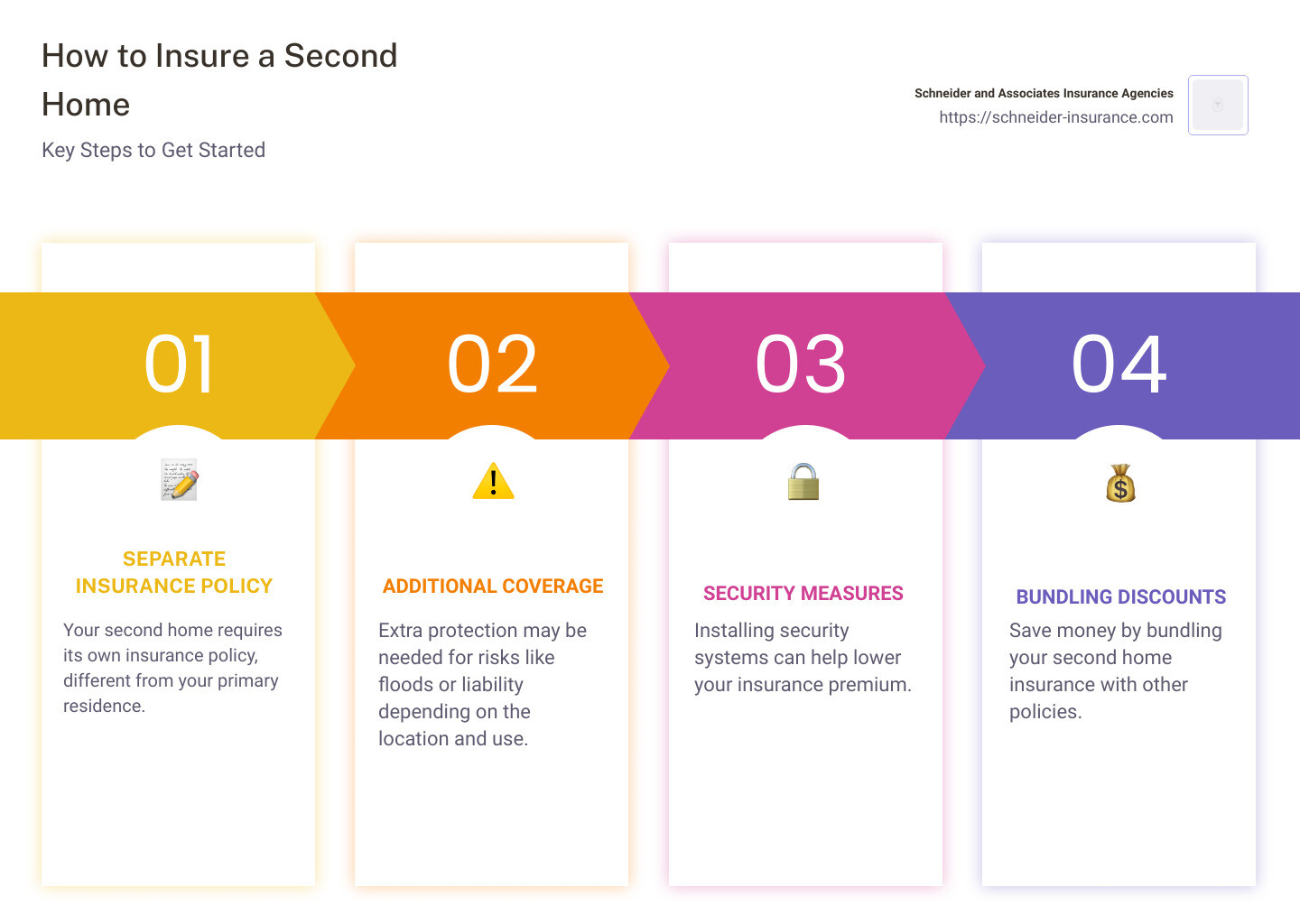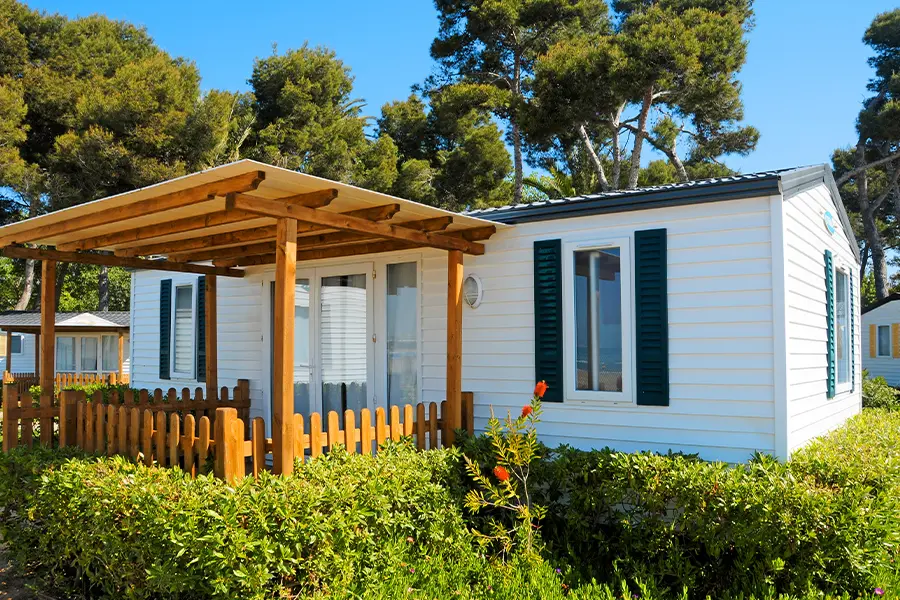Second Home Insurance: How to Get the Best Coverage

Introduction
If you’re wondering how to insure a second home, we’ve got you covered. Here’s a quick overview to get you started:
Separate Insurance Policy: Unlike your primary residence, your second home needs its own insurance policy.Additional Coverage: Depending on the location and use, you might need extra protection for risks like floods or liability.Security Measures: Installing security systems can help lower your premium.Bundling Discounts: Bundle your insurance policies to save money.
Owning a second home, whether it’s a beachside retreat in Florida or a mountain cabin, is a dream for many. But this dream brings unique risks that make second home insurance essential.
Unlike your primary residence, a second home often remains unoccupied for long stretches. This increases risks like burglary and damage from unnoticed issues, which is why second home insurance policies tend to be more expensive and require specific coverage.
In this guide, we’ll walk you through everything you need to know to get the best coverage for your second home. Our goal is to ensure you can enjoy your getaway without worrying about what might go wrong.

Why is Second Home Insurance More Expensive?
Second home insurance is typically more expensive than insurance for your primary residence. Here are the main reasons why:
Vacancy Risk
A major factor driving up costs is the vacancy risk. Unlike your primary home, your second home often sits empty for extended periods. This increases the likelihood of unnoticed issues turning into major problems. For example:
Leaks: A small leak can turn into significant water damage if no one is around to catch it early.Fires: Faulty wiring or other issues can cause fires that go undetected until it’s too late.
Burglary
Homes that aren’t occupied all the time are more attractive targets for burglars. According to the Insurance Information Institute (III), theft is a significant concern. In 2018, 98.1% of homeowner claims were due to property damage, including theft. This means:
Higher Risk: Your second home is more likely to be broken into than your primary residence.Increased Premiums: Insurance companies charge more to cover this higher risk.
Higher Rates
The combination of vacancy risk and burglary leads to higher insurance rates. Insurers see second homes as riskier investments, which translates to higher premiums. For instance, American Family estimates that vacation home policies are typically two to three times more expensive than home insurance for full-time residences.
Vacation Homes
Vacation homes come with their own set of risks:
Location: Many vacation homes are in high-risk areas like coastal regions prone to hurricanes or mountainous areas susceptible to wildfires. This can significantly increase your insurance costs.Amenities: Features like pools, hot tubs, and fire pits add to the liability risk, further driving up premiums.


In summary, second home insurance is more expensive due to the increased risks associated with vacancy, burglary, and the specific nature of vacation homes. Understanding these factors can help you make informed decisions when insuring your second home.
Next, we’ll explore how to insure a second home effectively to ensure you get the best coverage at a reasonable price.
How to Insure a Second Home
Insuring a second home involves a few unique steps compared to your primary residence. Here, we’ll break down what you need to know about separate policies, mortgage requirements, and liability coverage.
Understanding Named Perils Policies
Unlike your main home, second homes often require a separate insurance policy. This is because they come with different risks. For instance, a vacation home might be vacant for long periods, making it more susceptible to issues like burglary or unnoticed damage.
A key aspect of second home insurance is the “named perils” policy. This type of policy only covers specific events listed in the contract. For example, your policy might cover damages from fire, lightning, or theft but not from floods or earthquakes. The National Association of Insurance Commissioners (NAIC) notes that insurance for second homes is typically written on a named perils basis due to these increased risks.
Named perils policies provide limited coverage. This means if your second home is damaged by something not listed in your policy, you likely won’t be covered. It’s crucial to understand exactly what perils are named in your policy to avoid any surprises.
Extending Liability Coverage
Liability coverage is another important consideration. Some insurers might extend the liability portion of your primary home insurance to your second home. This means if someone gets injured at your vacation home and you’re found liable, your primary home’s policy might cover their medical bills or your legal fees.
However, this extension isn’t always automatic. It’s essential to check with your insurer. In some cases, a personal umbrella policy can provide additional liability protection. This type of policy kicks in when your primary liability coverage is exhausted, offering extra peace of mind.
The NAIC also emphasizes the importance of understanding how your primary home policy interacts with your second home. Ensuring that your liability coverage extends appropriately can save you from significant financial risk.
In summary, when insuring a second home, you’ll need a separate policy that often covers named perils only. Checking how liability coverage from your primary home might extend to your vacation home is also crucial. Next, we’ll dive into the factors that affect second home insurance costs to help you budget effectively.
Factors Affecting Second Home Insurance Costs
Understanding the factors that impact the cost of second home insurance can help you make informed decisions. Here are the key aspects you need to consider:
Location-Based Risks
Location is a major factor in determining insurance costs. Homes in areas prone to natural disasters like floods, wildfires, or hurricanes will have higher premiums. For instance:
Flood-prone areas: Homes near lakes, rivers, or oceans may require separate flood insurance policies. Flooding can cause extensive damage, and standard homeowners insurance usually doesn’t cover it.Wildfire risk: Properties in remote or mountainous areas are more susceptible to wildfires, leading to higher insurance costs.Storm surge: Beachfront homes face risks from hurricanes and storm surges, which can significantly raise premiums.
Property Type and Amenities
The type of property and its amenities also play a big role in insurance costs:
Single-family homes: These typically have higher premiums compared to condos or townhouses because they lack shared security features.Condominiums: Often cheaper to insure because the homeowners association usually covers the building’s exterior, reducing your insurance needs.Pools and hot tubs: While great for relaxation, these amenities increase liability risks and can drive up your insurance costs. Additional liability coverage is often recommended.
Age of Property
Older properties usually cost more to insure. Insurers consider the likelihood of structural issues and outdated systems:
Older homes: May require more maintenance and are seen as higher risk, leading to higher premiums.Newer homes: Typically better maintained and built to modern standards, often resulting in lower insurance costs.
Use of Property
How you use your second home affects your insurance needs and costs:
Vacation home: If the property is vacant for long periods, it’s at higher risk for theft and unnoticed damage, increasing insurance costs.Rental home: Renting out your property, whether short-term or long-term, usually requires additional coverage. For instance, landlord insurance protects against tenant-caused damages and can replace lost income if the property is being repaired.
Location-Based Risks
Choosing a location with fewer risks can help lower your insurance costs:
Remote areas: While appealing, these homes are often at higher risk for natural disasters and may have higher insurance premiums.Secure locations: Homes in gated communities or areas with lower crime rates can be cheaper to insure.
By understanding these factors, you can better budget for your second home insurance and ensure you have the right coverage. Next, we’ll discuss tips to save on your second home insurance.
Tips to Save on Second Home Insurance
Bundling Policies
One effective way to save on second home insurance is by bundling your policies. When you bundle your second home insurance with your primary residence policy under the same insurer, you may qualify for significant discounts.
For instance, if you insure both homes with Schneider and Associates Insurance Agencies, you could see a reduction in your premiums. Bundling not only streamlines your insurance management but also makes it easier to keep track of your policies and payments.
Installing Security Systems
Security systems can dramatically lower your insurance costs. Here are some options to consider:
Alarm Systems: Installing a centrally monitored alarm system can deter break-ins and alert first responders immediately.Fire Detection: Smoke detectors and fire alarms are crucial for early fire detection. Some systems even notify local fire departments directly.Break-In Detection: Motion sensors and smart locks can further secure your property against theft.
Smart Home Devices
Smart home devices can also help you save on insurance. These gadgets not only provide convenience but also enhance security and risk management:
Water Leak Sensors: These devices alert you to leaks, helping you prevent water damage.Smart Thermostats: They can adjust temperatures to avoid freezing pipes, a common issue in unoccupied homes.Surveillance Cameras: These offer real-time monitoring and can be a deterrent to potential burglars.
Choosing a Secure Location
The location of your second home plays a big role in your insurance costs. Here are some tips:
Avoid High-Risk Areas: Properties in flood-prone or wildfire-prone areas generally have higher insurance premiums.Opt for Gated Communities: Homes in gated or secure communities often benefit from lower insurance costs due to reduced crime rates.
By implementing these tips, you can effectively manage and potentially reduce your second home insurance costs. Next, let’s delve into insurance considerations if you plan to rent out your vacation home.
Insurance for Renting Out Your Vacation Home
Renting out your vacation home can be a great way to earn extra income. However, it comes with its own set of insurance challenges. Whether you’re planning for short-term or long-term rentals, how to insure a second home becomes crucial to protect your investment.
Short-Term Rentals
If you plan to rent out your vacation home for short periods (like through Airbnb), your standard homeowners insurance might not cover you. Here’s what you need to know:
Policy Endorsement: For one-time or occasional rentals, some insurers may allow you to add an endorsement to your existing policy. This extends your coverage to protect against damages or liabilities during the rental period.
Short-Term Rental Insurance: If you frequently rent out your property, you might need a separate business policy. This is sometimes referred to as short-term rental insurance or home-sharing insurance. It covers property damage, guest injuries, and theft during a rental.
Host Protection Insurance: While platforms like Airbnb offer some insurance, it’s often limited. For example, Airbnb’s policy does not cover loss of income if your property is damaged and uninhabitable.
Example: Jane rents her beach house on Airbnb. She adds a short-term rental endorsement to her homeowners policy. This way, she’s covered if a guest accidentally damages her property or gets injured during their stay.
Long-Term Rentals
Renting out your vacation home for longer periods (like seasonal rentals) requires different insurance considerations:
Landlord Insurance: If you plan to rent out your property for months at a time, you’ll need landlord insurance. This policy covers property damage, liability, and loss of rental income if the home becomes uninhabitable.
Tenant Screening: Screening tenants can help reduce risks. A thorough process can prevent renting to individuals who might cause damage or fail to pay rent.
Renter’s Insurance: Encourage or require your tenants to have their own renter’s insurance. This protects their personal belongings and can reduce your liability.
Example: Mike rents out his mountain cabin for six months each year. He has a landlord insurance policy that covers property damage and liability. He also screens tenants carefully and requires them to have renter’s insurance.
By understanding these different rental scenarios and insurance options, you can ensure your vacation home is well-protected, whether you’re renting it out short-term or long-term.
Frequently Asked Questions about Second Home Insurance
Why is second home insurance so expensive?
Vacancy: Second homes are often vacant for long periods. This increases the risk of undetected issues like leaks, fires, or infestations.
Burglary Risk: An empty home is more likely to be targeted by burglars. This added risk raises insurance premiums.
Higher Rates: Due to these risks, insurers charge higher rates for second homes compared to primary residences. Source
Does an umbrella policy cover a second home?
Liability Protection: An umbrella policy can extend liability coverage beyond your primary home insurance. This is useful if someone gets injured on your second property and decides to sue.
Personal Umbrella Policy: This type of policy provides additional liability coverage that kicks in when your primary policy limits are exhausted. For example, if a guest gets injured in your vacation home and the medical costs exceed your homeowners insurance limits, the umbrella policy covers the excess. Source
What are the considerations for insuring a secondary residence?
Location: Homes in flood-prone areas or regions susceptible to wildfires may have higher insurance costs. If your second home is in a remote area, it might also be more expensive to insure due to increased risks and higher repair costs.
Property Type: Different types of properties come with different insurance needs. A single-family home might be more expensive to insure than a condominium, where the homeowners association covers some of the exterior maintenance and insurance.
Belongings: The value and amount of personal belongings in your second home also affect insurance costs. If you keep valuable items in your vacation home, you may need additional coverage to protect them. Source
Understanding these factors can help you get the best coverage for your second home while managing costs effectively.
Conclusion
At Schneider and Associates Insurance Agencies, we understand that insuring a second home can be complex. That’s why we offer personalized solutions tailored to meet your specific needs. Whether your second home is a cozy cabin in the woods or a beachfront property, our team is dedicated to providing you with the right coverage.
Our approach is to offer tailored coverage that considers your unique situation. We take into account factors like the location, type of property, and how you use it. This ensures you get comprehensive protection without paying for unnecessary extras.
We pride ourselves on our local touch. Our agents are familiar with the specific risks and requirements of different areas, allowing us to give you expert advice and support. We’re here to help you navigate the complexities of insuring a second home, so you can enjoy your property with peace of mind.
Ready to protect your second home? Get a quote today and let Schneider and Associates Insurance Agencies take care of your insurance needs.









